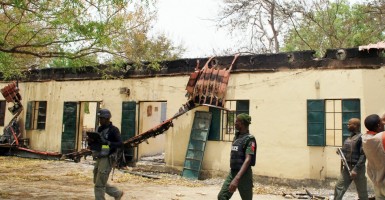“Africa is not burning,” and “our presence in Nigeria is really a statement that terrorism cannot win.” These are the words of the president of the African Development Bank who spoke at the just concluded World Economic Forum on Africa in Nigeria.
Indeed, advancing economic freedom that leads to more inclusive growth and dynamic job creation is indispensable in ensuring greater and securer futures of Nigeria as well as the continent as a whole.
The May 7–9 forum, which was supposed to be a great economic diplomatic breakthrough for Nigeria, was overshadowed by international concern over the kidnapping of over 250 teenage girls by Boko Haram, which Hillary Clinton’s State Department failed to designate terrorists. Nonetheless, Nigeria’s successful conclusion of the forum, together with the recent rebasing of its gross domestic product that has elevated the country as Africa’s largest economy, should not be ignored and should be reinforced with the country’s greater commitment to economic freedom. As pointed out by Philipp Rosler, a managing director and member of the Managing Board of the World Economic Forum:
Nigeria is a country that not only embodies the hopes and challenges of a whole continent, but could actually determine them. Home to a quarter of sub-Saharan Africa’s population, it is now also its economic motor, growing much faster than South Africa. A cultural behemoth, “Nollywood,” is now the country’s second largest employer behind agriculture…. It is also a country enduring growing pains illustrative of the vast social and economic problems still felt by ordinary Africans all across sub-Saharan Africa. Problems that, if left unchecked, threaten to derail the considerable progress of recent years and plunge the region back into instability.
Nigeria is at a critical crossroads. Despite the economic boom in recent years, the Nigerian economy has fluctuated only between “repressed” and “mostly unfree” over the past 20 years, according to the annual Index of Economic Freedom, a data-driven policy guidebook jointly published by The Heritage Foundation and The Wall Street Journal. This poor performance has not delivered any dynamic and meaningful employment growth for many ordinary Nigerians.
During the forum, Nigerian businessman Aliko Dangote, who has been deemed Africa’s richest man, unmistakably highlighted the importance of job creation by the private sector in confronting the dark ideology of extremist groups such as Boko Haram: “We want to create 180,000 new jobs in Nigeria. This is the best recipe against terror.”
Economic freedom is the main ingredient in this recipe. Advancing economic freedom should serve as the foundation of Nigeria’s brighter future.
Read more about Nigeria Economy.
See more from the 2014 Index.


























